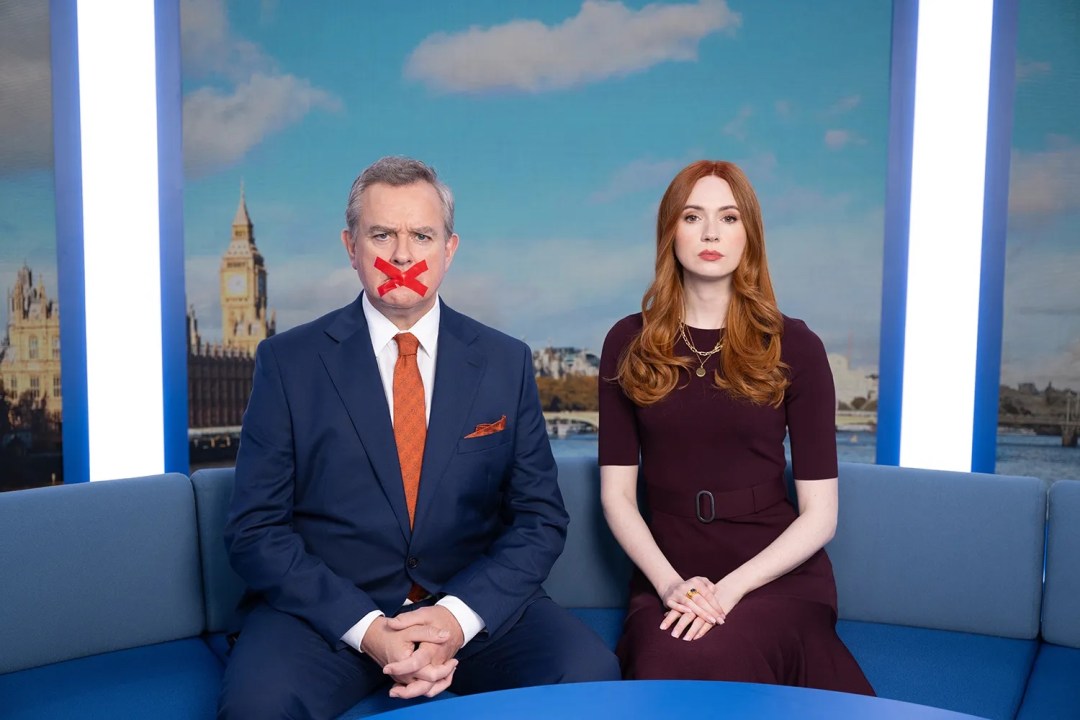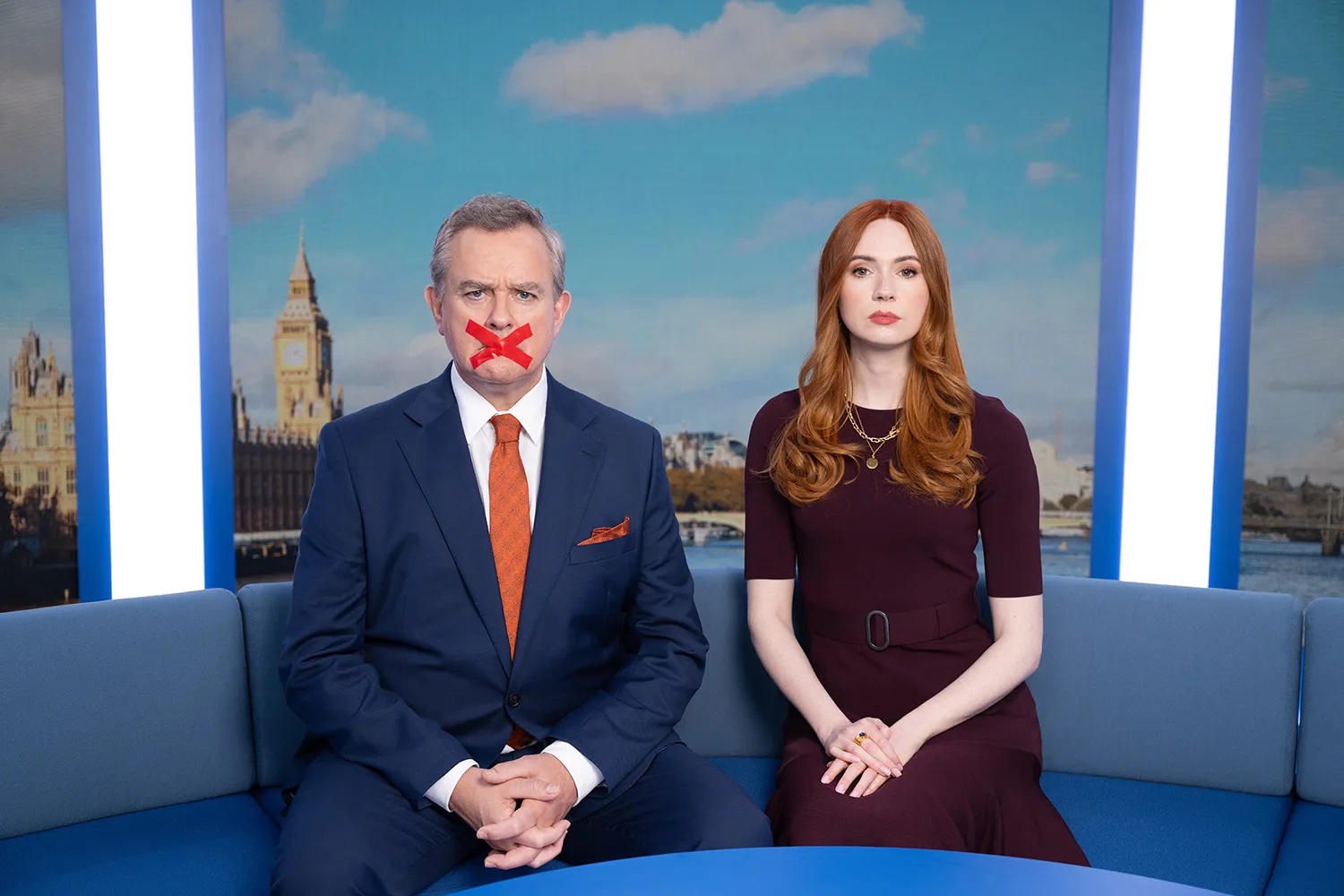Douglas Is Cancelled, the new drama series on ITV, should come with a trigger warning – for me, anyway. Watching it brought back memories of my own cancellation six years ago, which I found so traumatic that I lost half a stone. Admittedly, the middle-aged white man at the centre of this drama (Hugh Bonneville) only has one position to lose – he’s a television presenter – whereas I lost five. But apart from that the similarities are uncanny. Did the writer, Steven Moffat, read the 5,000-word piece I wrote about my experience? Or do all cancellations follow the same pattern?
Douglas’s trial begins when someone on Twitter says they overheard him telling a sexist joke at a wedding. They don’t say what the joke was, and he was drunk at the time so can’t remember, but everyone assumes the worst and his career is soon in jeopardy. Before long, the joke is being described by those trying to help him, like his agent, as not merely sexist, but misogynistic, forcing Douglas to correct them: ‘It was sexist, goddamnit!’ Needless to say, this doesn’t make things better – something I discovered too. One of my sins was making a sexist joke and it was spun into something far worse. Left-wing women would take to Twitter, demanding I be fired, and then add #MeToo, as if I was morally indistinguishable from Harvey Weinstein. Protesting that I hadn’t actually raped anyone did nothing to help.
I was on the point of saying yes to being interviewed by Emily Maitlis when my wife Caroline brought me to my senses
Like me, Douglas assumes it’s just a storm in a teacup and the media circus will quickly move on. But the opposite happens – a terrible symbiosis occurs between social and print media, with each amplifying what the other is saying in a kind of reverse echo chamber effect, whereby every time an allegation bounces between the two it gets louder. What Douglas fails to anticipate is the sheer glee people take in tearing someone down. They revel in their moral outrage and search feverishly for more things to be ‘offended’ by. The pretence is that certain words or jokes cause ‘harm’ to ‘minorities’. These same head prefects then plaster social media with all the inappropriate things you’ve said, which makes it obvious that their outrage is performative because if they genuinely thought your words caused harm, they wouldn’t shout them from the rooftops.
In the midst of this assassination attempt, Douglas is supposed to be making an appearance at Hay Festival, where he’s due to be interviewed on stage about his life and career. He worries about whether the joke will come up, but at least the interviewer is an empathetic type like Kate Garraway. Then, to his horror, she’s replaced by Emily Maitlis. At this point, I thought the writer must have studied my cancellation because I too was approached by the BBC’s Grand Inquisitor and wrestled with whether to go through with it, as Douglas does. This was before she’d eviscerated Prince Andrew on Newsnight, so it wasn’t quite the no-brainer that it is for him. I was on the point of saying yes when Caroline – like me, Douglas has a sensible wife – brought me to my senses. (‘Are you insane?’, etc.)
I should say, if it isn’t already obvious, that Douglas Is Cancelled is a lot of fun. In reality, I don’t suppose Moffat confined himself to reading just my article. He’s researched the topic so thoroughly that anyone who’s been through one of these ordeals will experience the same oh-my-god-this-is-all-about-me sensation. But what makes it so enjoyable – for members of the Cancelled Club, anyway – is that Moffat is on Douglas’s side. OK, he’s a bit of a buffoon, but there’s no way he deserves to lose everything because he told a sexist joke.
Moffat grasps a point which struck me at the time, which is there’s something comedic about how disproportionate it is for anyone to be cancelled for using hurty words. In my case, it unfolded with a horrible sense of inevitability, as if the universe had suddenly turned nasty, and everything I did to try to placate the gods – such as apologising – just made things worse. As with all good comedies, it had the same structure as a tragedy, but the only thing at stake was my amour propre. Yes, there were also those five jobs and the question of how I was going to pay the mortgage, but the heart of it was a rather vain, self-important man being humiliated, so it was essentially funny. At least, it would have been if it had been happening to somebody else.
I remember comforting myself with the thought that I was being furnished with great material for a TV drama and I took copious notes, thinking I would write it when the dust had settled. Moffat has beaten me to the punch and done a very fine job.









Comments